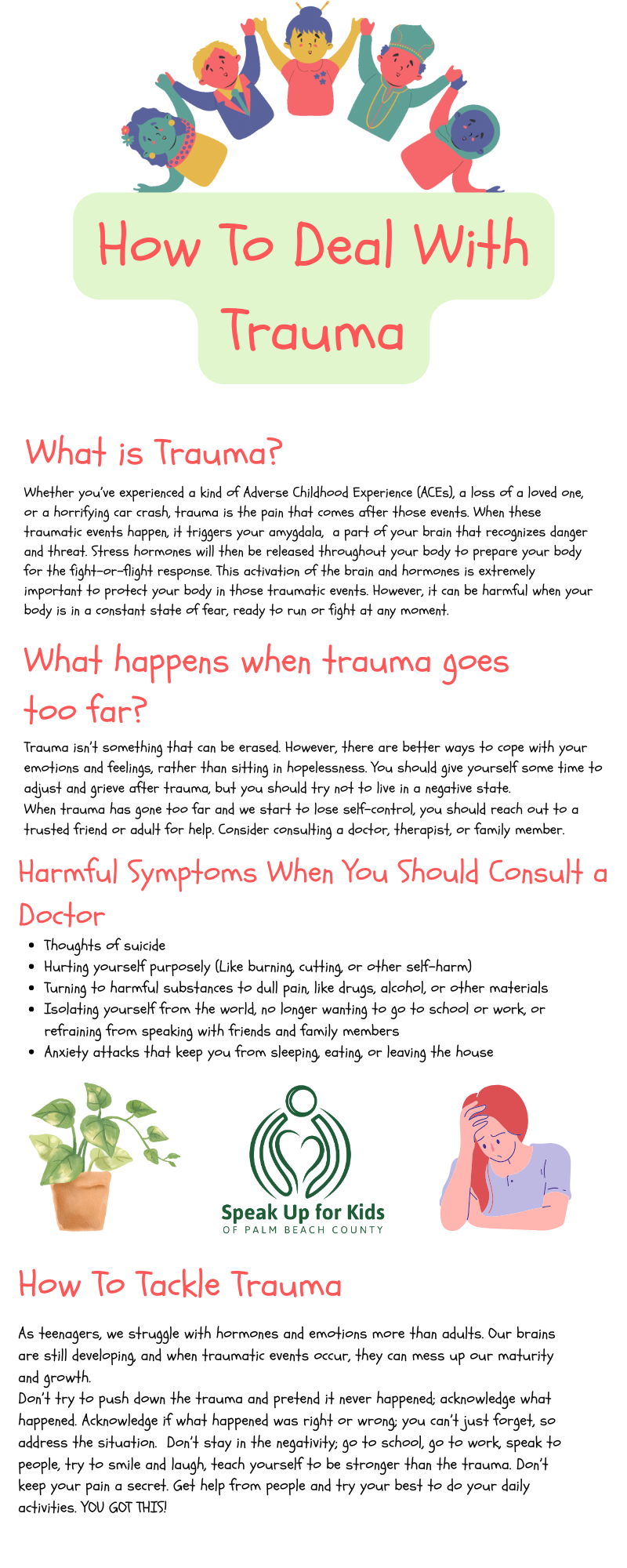How the Human Body Responds to Trauma
Contributed by Shyla Woodkurm — Speak Up for Kids Student Intern, a homeschooled student with a passion for writing and music, self-taught pianist, and historical fiction author who enjoys editing, storytelling, and faith-based community engagement.
Overview
Think of your body as a computer system with multiple different parts. Then think of trauma as a glitch in the program, a virus, something that ruins the way the computer functions, it takes over the device, and the computer can’t work properly. You are the computer in this case, and trauma can act as the virus. It can invade your emotions, your thoughts, your health, everything. But you are strong, and you can keep the virus from taking over. You are in control of your body.
What Causes Trauma?
Have you ever had a traumatic event happen to you before? Most of us have. Whether it involves one of the ACEs (Adverse Childhood Experiences), having a loved one die, a terrifying car crash, or something else. When those traumatic events happen, it activates the amygdala, a part of the brain responsible for detecting threats or danger when your body is afraid. Once your amygdala is activated, it sends stress hormones throughout your body like an alarm system. Almost like a fire alarm, warning your body that there is danger. This system of defense is extremely important for everyone; when something dangerous does happen to us, our body is filled with adrenaline, a hormone that pumps our blood and raises our heartbeat in preparation to run or fight in defense. Though this defense system is very beneficial in harmful situations, trauma is developed and expressed when the body remains in a fight, flight or freeze position. It can feel almost uncontrollable at times, with symptoms ranging from emotional to physical.
Normal Symptoms of a Post-Traumatic Event
It is normal for your body to feel a little shaken up after these stressful moments. Symptoms can include but are not limited to:
Emotional Symptoms
Numbness or detachment from the world
Depression or continuous grieving
Anger
Shame or guilt; blaming yourself for what happened (even if it is not your fault)
Anxiety and panic attacks, feeling like you have no control
Physical symptoms
Trouble sleeping, waking up a lot, nightmares
Stomachaches, headaches, or random body pain
Fatigue and low energy
Racing heartbeat
Changes in appetite (eating a lot or eating nothing at all)
Harmful Responses to Trauma
There is no ‘right’ way to react to trauma; it usually leaves a big impact on you for years and sometimes a lifetime. Though memories cannot be erased, there are ways to treat trauma without living in the torture of post-traumatic symptoms. Reacting to trauma can be harmful when you respond in negative ways or have unusual thoughts and feelings. It’s important to understand these responses to help you heal and move forward. Harmful responses include:
Thoughts of suicide
Hurting yourself purposely (Like cutting, burning, or other self-harm)
Looking to addictive substances to cope with your emotions, like drugs, alcohol, or other risky materials
Pulling away and isolating yourself from family and friends
Skipping usual activities like school, work, or other activities you usually found joy in
Anxiety attacks that stop you from eating, sleeping, or leaving the house
Violent thoughts towards other people (fear of losing control and harming someone else)
Important Reminder
As teenagers, our brains are still growing, and our emotions can sometimes be intense. If something traumatic happens to you, it's important to be careful about how you cope. It's tough to say no to drugs or other substances that might seem like a way to ease your pain. But you are stronger than that. Talk to trusted adults—like parents, guardians, friends, or therapists. Sharing your feelings, whether by writing or talking, can also make a difference. Try to keep a regular routine of eating, sleeping, and doing daily activities to avoid feeling alone or depressed.
Final Thoughts
While distractions can help, it's really important to acknowledge the trauma you've experienced and understand the situation that caused your trauma without staying in a hurt, isolated state. Remember, you don’t have to handle this alone. Many people want to help you feel better. If your symptoms become too much to bear, reach out for support. You are not alone in this.


